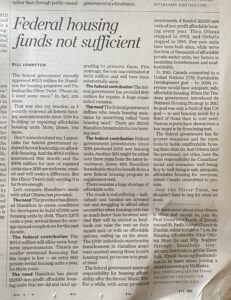 Ottawa needs to do a great deal more to tackle the crisis of housing affordability, Bill Johnston, co-chair of our Affordable Housing Team, argued in an opinion piece that ran in the Spectator on Tuesday.
Ottawa needs to do a great deal more to tackle the crisis of housing affordability, Bill Johnston, co-chair of our Affordable Housing Team, argued in an opinion piece that ran in the Spectator on Tuesday.
You can read it below.
Opinion Article in the Hamilton Spectator
Tuesday October 24, 2023
Federal housing funds not sufficient
By Bill Johnston
The federal government recently approved $93.5 million for Hamilton for housing programs and I’m feeling like Oliver Twist: “Please Sir, I want some more.” In fact, lots more.
That was also my reaction as I recently reviewed all federal funding announcements since 2019 for building or repairing affordable housing units. More, please, lots more.
Don’t misunderstand me. I appreciate that the current federal government restored federal leadership on affordable housing. And the $93.5 million announced this month and the $398 million for new or repaired units since 2019 are welcome, needed and make a difference.
But like Oliver Twist’s daily serving, it is far from enough.
Let’s compare Hamilton’s needs with what Ottawa has provided.
The need: The province has directed Hamilton to create conditions for developers to build 47,000 new housing units are built by 2031. That’s 5,875 units a year, several times the average annual completions for the past decade.
The federal contribution: The $93.5 million will allow some long-term improvements. There’s no similar provincial financing. But the target is low—an extra 900 private rental housing units a year, for three years.
The need: Hamilton has about 13,000 non-profit affordable housing units that are old and need upgrading to preserve them. Five years ago, the cost was estimated at $632 million and will have risen substantially since.
The federal contribution: The federal government has provided $145 million for repairs. A huge repair deficit remains.
The need: The federal government defines who needs housing assistance by something called “core housing need.” There are 28,055 Hamilton households who are in core housing need.
The federal contribution: Federal government investments since 2019 produced 1,053 new housing units. Another 500 might be added over three years from the latest investment. Some 400 Hamilton households benefit from a new federal housing benefit to supplement rent.
There remains a huge shortage of affordable units.
Plus, 60 per cent of the money provided by Ottawa for new housing or repairs was not funding, just financing. It was loans that have to be repaid. Repaying the loans is an ongoing expense that reduces the ability of housing providers to provide really low rents.
The result is real suffering—individuals and families stressed out and struggling to afford other necessities when housing costs rise so much faster than incomes; worried that they will be evicted so landlords can raise the rent on their vacant unit; or with no affordable options, ending up on the street. The 1,900 individuals experiencing homelessness in Hamilton aren’t even counted among those in core housing need, yet no one is in greater need.
The federal government assumed responsibility for housing affordability after the Second World War. For a while, with some provincial investments, it funded 20,000 new units of non-profit affordable housing every year. Then Ottawa stopped in 1993, and Ontario stopped in 1995. Few new units have been built since, while we’ve lost tens of thousands of affordable private-sector units, key factors in escalating homelessness and unaffordability.
In 2015, Canada committed to a United Nations Sustainable Development goal—by 2030, everyone would have adequate, safe, affordable housing. When the Trudeau government introduced its National Housing Strategy in 2017, its goal was only a third of that UN goal—to end housing need for a third of those then in core need. Various reports have shown that even a low target is far from being met.
The federal government has far greater resources and far more tools to tackle unaffordable housing than cities do. And Ottawa (and the provinces), not cities, have the main responsibility for Canadians’ social and economic well-being. Key to well-being is safe, adequate, affordable housing for everyone, which Canada committed to provide.
Just like Oliver Twist, we shouldn’t have to beg for what we need.
[This version is slightly amended from what appeared in the Spectator on October 24, 2023.]